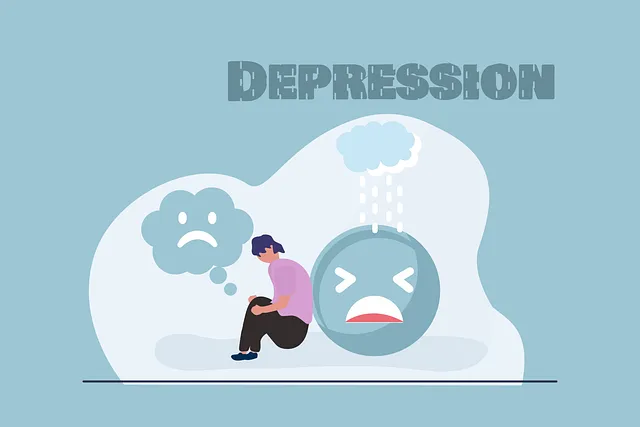The Louisville Kaiser Permanente psychiatry reviews highlight the severe burnout rates among mental health professionals, particularly in psychiatry, due to high patient volumes and emotional demands. These studies advocate for intervention strategies like mindfulness meditation, self-care practices, and public awareness campaigns to destigmatize mental health issues. Effective prevention methods include resilience building, Mental Wellness Journaling, Exercise Guidance, Empathy Building Techniques, and crisis intervention resources provided by the organization. Louisville Kaiser Permanente's commitment to fostering emotional well-being and inner strength through comprehensive psychiatry reviews contributes to better patient outcomes, staff resilience, and a dedicated healthcare workforce.
Healthcare provider burnout is a growing concern, especially within practices like Louisville Kaiser Permanente. This article explores strategies to combat burnout among healthcare professionals, drawing insights from comprehensive Louisville Kaiser Permanente psychiatry reviews. We delve into identifying risk factors and early warning signs, highlighting evidence-based prevention methods and the significance of self-care. Additionally, it emphasizes creating supportive work environments that foster resilience, offering a holistic approach to well-being for dedicated medical staff.
- Understanding Burnout Among Healthcare Providers: A Look into Louisville Kaiser Permanente Psychiatry Reviews
- Identifying Risk Factors and Early Warning Signs
- Evidence-Based Strategies for Prevention and Well-being
- Creating a Supportive Work Environment
- The Role of Self-Care and Resilience in Sustaining Mental Health
Understanding Burnout Among Healthcare Providers: A Look into Louisville Kaiser Permanente Psychiatry Reviews

Burnout among healthcare providers is a growing concern, especially within specialized fields like psychiatry. The Louisville Kaiser Permanente Psychiatry Reviews shed light on this pressing issue, revealing the unique challenges faced by mental health professionals. These reviews highlight that burnout rates in psychiatry are significantly higher than in other medical specialties, with factors such as high patient loads, emotional demands, and limited time for self-care contributing to this phenomenon.
The studies indicate that healthcare providers in psychiatry often experience a constant barrage of complex cases, leading to increased stress and reduced job satisfaction. Additionally, the reviews suggest that fostering a culture of mindfulness meditation and encouraging self-care practices could be effective prevention strategies. Moreover, public awareness campaigns development can play a pivotal role in reducing the stigma surrounding mental health issues, thereby improving work environments for these dedicated professionals.
Identifying Risk Factors and Early Warning Signs

Healthcare provider burnout is a significant concern, and identifying risk factors and early warning signs is crucial for prevention. Studies like those from Louisville Kaiser Permanente psychiatry reviews highlight that high-pressure environments, heavy workloads, and a lack of support can contribute to mental health issues among healthcare workers. These factors often lead to decreased job satisfaction, reduced performance, and increased rates of depression and anxiety.
Resilience building and self-esteem improvement techniques are proven strategies to mitigate these risks. Additionally, mental illness stigma reduction efforts play a vital role in creating a supportive work environment. By fostering open discussions about mental health challenges, healthcare organizations can encourage professionals to seek help early, thereby preventing burnout before it becomes severe.
Evidence-Based Strategies for Prevention and Well-being

Healthcare provider burnout is a growing concern, but evidence-based strategies offer hope for prevention and promotion of well-being. Louisville Kaiser Permanente psychiatry reviews highlight successful initiatives such as Mental Wellness Journaling, where providers are encouraged to reflect on their experiences, emotions, and challenges, fostering self-awareness and resilience. Regular Exercise Guidance from organizational leaders can incorporate movement into daily routines, reducing stress and improving overall emotional well-being.
Additionally, Empathy Building Strategies have proven effective in enhancing patient interactions and job satisfaction. Techniques like active listening, cultural competency training, and mindfulness practices enable healthcare providers to connect more deeply with patients, fostering a supportive environment that benefits both the caregiver and the cared-for. These strategies, when integrated into work cultures, can revolutionize burnout prevention, ensuring providers feel valued, supported, and inspired in their crucial roles.
Creating a Supportive Work Environment

At Louisville Kaiser Permanente, renowned for its psychiatry reviews, creating a supportive work environment is seen as a cornerstone in burnout prevention. This involves fostering a culture where mental wellness is prioritized and inner strength development encouraged. Staff are provided with resources like crisis intervention guidance to handle personal challenges, ensuring they can provide optimal care without burning out.
The organization understands that a healthy work environment contributes directly to better patient outcomes. By supporting healthcare providers in building their resilience and managing stress, Louisville Kaiser Permanente aims to sustain a dedicated workforce capable of delivering quality mental health services. This approach not only benefits individual practitioners but also ensures continuity of care for the community it serves.
The Role of Self-Care and Resilience in Sustaining Mental Health

In the demanding landscape of healthcare, where long hours and high-stress situations are common, self-care becomes an indispensable tool for burnout prevention. Louisville Kaiser Permanente psychiatry reviews consistently highlight the importance of resilience and emotional well-being in sustaining mental health among medical professionals. Self-care practices, such as mindfulness meditation, regular exercise, and adequate sleep, empower healthcare providers to manage stress and maintain a sense of balance. Incorporating compassion cultivation practices can further enhance emotional regulation, fostering an environment where providers feel supported and understood, ultimately reducing the risk of burnout.
Mental illness stigma reduction efforts play a crucial role in promoting self-care. By creating spaces that encourage open conversations about mental health challenges, healthcare organizations can foster a culture of empathy and understanding. This, in turn, allows professionals to prioritize their emotional well-being without fear of judgment or repercussions. Louisville Kaiser Permanente’s commitment to these initiatives underscores its dedication to supporting the holistic health of its providers, ensuring they are equipped to offer compassionate and effective care to their patients.
In light of the insights from Louisville Kaiser Permanente psychiatry reviews, it’s clear that addressing healthcare provider burnout is a multifaceted endeavor. By identifying and mitigating risk factors, implementing evidence-based prevention strategies, fostering supportive work environments, and promoting self-care, we can enhance mental well-being among healthcare professionals. These approaches, informed by both research and practical experience, are essential steps towards creating a more sustainable and resilient healthcare system.






